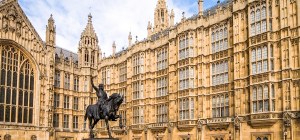62: Brexit 2019 – Can you stop the cavalry?

Aaron Nelson Legal Director
This is a joint blog by Aaron Nelson, author of the Brexit Blog, and Stuart Thomson, author of the Public Affairs Blog.
We were so pleased at last year’s prodigious display of joint clairvoyance (no General Election, Jeremy Corbyn still being Labour Party leader, the never-ending discussion about Brexit…) that we thought we’d have another go.
(Let’s just ignore that Chris Grayling is still in the Cabinet, and Priti Patel hasn’t returned – it’s the season of goodwill after all!)
What questions should be asked for 2019?
- Deal or No Deal? The Government’s decision to delay Parliament’s ‘meaningful vote’, on the Withdrawal Agreement until the week of 14 January (after it became abundantly clear that it wasn’t going to win) means that we are no clearer whether the UK will leave the EU with or without a deal on 29 March 2019 – less than 100 days away. The PM went to December’s EU summit to try to obtain sufficient ‘legal and political assurances’ from the EU27 about the temporary nature of the backstop to try to convince Tory backbenchers and the DUP to support her. The EU refused to renegotiate the text of the Withdrawal Agreement itself, and offered only a ‘best endeavours’ assurance about negotiating the future partnership (which would make the backstop unnecessary). The DUP had indicated that such ‘tinkering’ would fall short of the ‘legally binding changes’ they had been promised, but it seems Tory backbenchers might be more persuadable: Jacob Rees-Mogg, one of the PM’s harshest critics in recent weeks, has now said he will support her. Will she get the numbers? Indications are that she will not.
- Will the UK leave the European Union on 29 March 2019? Leaving the EU is the policy of both the Government and the official Opposition so it will take a significant (some would say unprecedented) political shift to stop that happening. But these are ‘interesting times’, with the Cabinet and both major parties divided on Brexit, and Parliament split along non-party lines. If the Withdrawal Agreement is rejected, Parliament may force the Government to concede that there is a clear political will to (at least) delay Brexit, if only to work out the form that Brexit will take. And, while it’s generally said that the ‘default’ legal position is that the EU (Withdrawal) Act 2018 (EUWA) provides for the UK’s exit on 29 March 2019 (and so Parliament would have to pass more legislation to stop it), the Government has not yet brought those EUWA provisions into force. Sticking our necks out here, we say ‘exit day’ can, and will, be postponed.
- What are the chances of a People’s Vote? Extremely slim, but (like a turkey before Christmas) growing all the time. If Parliament rejects the Government’s deal, indications are that it will look at all available options to avoid ‘no deal’, with consequences anticipated to include major tailbacks at ports, stockpiling food and medicines, a major economic downturn, the need for troops to be mobilised – Can we stop the cavalry? Labour’s conference motion was to ‘support all options remaining on the table, including campaigning for a public vote’ should it not be able to secure a general election, which at least leaves the door open for a second referendum. And at least one Cabinet member (Amber Rudd) has now broken ranks and suggested a vote might be the only way to break the deadlock. Of course, it’s not clear what question(s) would be posed in any such referendum, never mind what the outcome would be!
- Will Theresa May be Prime Minister next Christmas? Unlikely, but don’t rule it out. Having survived a leadership challenge, she is safe from another one for a year. But, if Parliament rejects her hard-fought deal, she could still resign in January. Even if the deal is passed, it was widely reported that, in order to win the vote of no confidence in her leadership, she agreed not to fight another General Election. If Brexit happens in March 2019, the Tories will want to give a new leader sufficient time to unite the party and map out a policy agenda for a post-Brexit UK. One route to her short-term survival she has repeatedly refused to countenance: seeking (and winning) approval of her deal through a second referendum.
- Will there be a General Election? Despite the existence of the Fixed Term Parliaments Act, with 5-year fixed terms, it seems that this question can still be asked every year. The answer, like everything else, is fundamentally bound up with the answer to the first question. Labour continues to hold fire on calling a vote of no confidence in the Government (which could trigger a General Election), because it knows it has not got the numbers: it cannot rely on the support of either the DUP or enough disgruntled Tories. The motion of no confidence it has tabled in the PM, is purely symbolic. The other opposition parties – the Lib Dems, SNP, Plaid Cymru and the Greens – have tabled their own no confidence motion in the Government but (as they are not the Leader of the Opposition) the Government need not give time to the motion. But that will almost certainly change if Parliament rejects the Government’s deal.
- Will there be a new Labour leader? If Brexit happens, there will be a lot of very disappointed Labour Party members. Many of the newer, younger members of the Party who have so far idolised Jeremy Corbyn could have a crisis of faith and we could see, for the first time, some serious discussion about his leadership, including the Shadow Cabinet’s disunity over Brexit policy, his strategy at PMQs, his handling of anti-Semitism within the Party, even his disputed ‘stupid woman’ comments – all demonstrate that he is not infallible. On the other hand, a disastrous ‘no deal’ Brexit may create exactly the sort of conditions which would sweep a radical Corbyn-led government into Downing Street.
- Will the DUP destroy the Union? If Northern Ireland is treated in the same way as the rest of the UK in the Brexit deal then the DUP will be happy and will, most likely, update their agreement with the Conservative Party to keep it in power. However, the cost of this may be high. Any outcome which sees the imposition of a hard land border in Ireland risks stoking renewed sectarian violence (hence the European Commission’s ‘no deal’ contingency plans avoiding that in the short term). The very future of the UK may also be at risk, as Scotland, and the SNP, come to terms with a ‘hard Brexit’ and life outside of the EU. The chances of another referendum on Scottish independence will raise significantly, as will its chances of success.
- What will feature in the Queen’s Speech? There is due to be a Queen’s Speech in 2019 (the last one covered a 2-year period). Assuming Brexit happens, one of the biggest challenges facing Parliament will be coping with the quantity of post-Brexit legislation coming its way, let alone having space for any ‘new agenda’ legislation. That’s not just the Bills to put new trading arrangements, fisheries, farming and immigration policies in place but a whole wave of secondary legislation to shift laws from the EU to the UK. A new PM could bring fresh ideas but the Government may not have the Parliamentary space to do anything about them. And don’t forget the lack of a majority which means radical ideas are less likely to succeed…
- Will a new political party emerge? The UK’s electoral system is a fundamental block on any new party emerging. However, should Brexit be delayed (or cancelled), we may see a host of defections to a revitalised UKIP, particularly from the ERG. That could trigger a whole series of by-elections and would have major ramifications for a minority Conservative government – although that new UKIP Parliamentary block may chose, like the DUP, to prop up the incumbent minority Conservative Government on non-Brexit matters. It seems far less likely that Remainers would defect to a new party en masse in order to campaign for the UK to stay in or rejoin the EU.
This blog is being written before the vote on the PM’s Brexit deal takes place and, as we have said above, that will likely shape events throughout 2019. We will be watching with interest. In the meantime, thanks for your support throughout last year, and Happy New Year!
Enjoying the blog? Why not try the Great Repeal Bill Blog playlist on Spotify.










